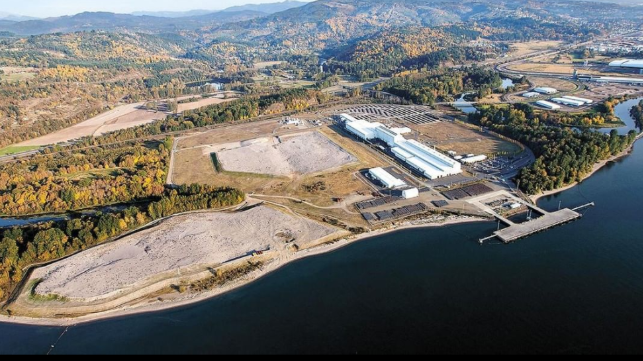Chinese Developer Terminates Lease for Kalama Methanol Plant

A Chinese state-owned enterprise has given up on its long-running plans to build a multi-billion dollar gas-to-methanol plant on the Columbia River, according to the Port of Kalama, Washington.
On Friday, the port announced that a Delaware-based subsidiary of Shanghai Bi Ke Clean Energy Technology Co. has decided to terminate its lease agreement for land to build a proposed 3.6 million tonnes-per-annum methanol plant. If it had been built, the project would have used West Coast-sourced gas to produce about one tanker of cargo every four days, with all output delivered to China for exclusive use in plastics production.
The plant's on-site carbon emissions would have put it in the top 10 CO2 sources state-wide, but its promoters suggested that its operations would result in a net drop in emissions on a global basis. By making methanol from cheap natural gas in the United States and shipping it to China, the plant would outcompete costly, carbon-intensive coal-based methanol on the Chinese market. In turn, this would induce Chinese coal-to-methanol plants to reduce production, creating a net reduction in CO2.
This prospectus counted on an expectation that the plant's output would be turned into plastic. However, opponents raised questions over whether the plant's methanol would instead be marketed for combustion as a transport fuel on the Chinese market, as its backers had suggested in a 2018 investor presentation (first reported by OPB). If the end product were burned, the plant's net CO2 emissions would be considerably higher than suggested.
The State of Washington's Department of Ecology agreed with these concerns, and in March it denied the plant's permit request, citing the project's potential impact on the climate and on Washington's shorelines. The backers said that they would appeal the decision, but on Friday, the Port of Kalama announced that Shanghai Bi Ke's U.S. partnership had decided to halt the effort altogether.
"This was the kind of innovative, job-creating project that originally was supported by the governor’s office. [Washington State Governor] Jay Inslee stood on Kalama’s waterfront to tout the climate benefits of the project, then turned on us when he ran for president," said Port Director Mark Wilson. "All the state has accomplished is to encourage more severe greenhouse gas emissions outside the borders of Washington and declare a false climate victory."
According to the port, the project would have created 1,400 construction jobs, 200 permanent jobs, and millions in local tax revenue.
"This project would have brought manufacturing jobs back to the US from China and significantly lowered a host of environmental impacts," said Ted Sprague, President of the Cowlitz Economic Development Council. "The reduction in global greenhouse gases would have been greater than the GHG emissions of Seattle. If not a project with benefits like this, then what is good enough?"

that matters most
Get the latest maritime news delivered to your inbox daily.
The Kalama plant was backed by Northwest Innovation Works (NWIW), an entity majority-owned by Shanghai Bi Ke Clean Energy Technology Co., itself a subsidiary of Chinese Academy of Sciences Holding Company. The chairman of Chinese Academy of Sciences Holding, Wu Lebin, told China Daily in 2017 that its Kalama plant was intended to produce clean-burning motor fuel. "If we replace diesel, coal and gas with methanol to power vehicles, emissions of PM2.5 (a critical air pollutant) would be slashed by 80 percent," Wu said.
NWIW has maintained that the plant would have produced methanol for plastic production only.
